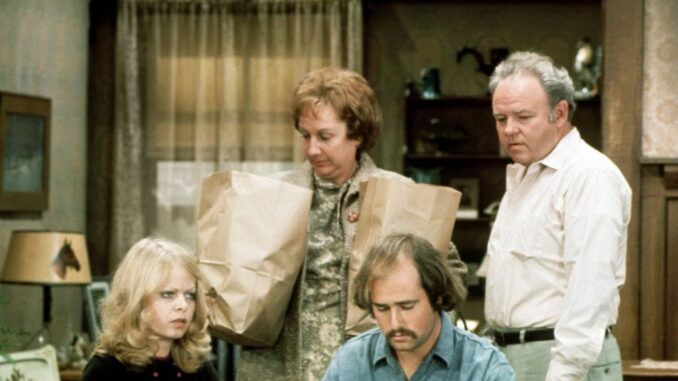
“All in the Family” stands tall as one of the most influential TV sitcoms ever produced. It challenged social norms, pushed boundaries, and sparked conversations across America. But while viewers laughed along with Archie Bunker’s outrageous lines, the atmosphere behind the camera wasn’t always so humorous. Conflicts simmered, personalities clashed, and passionate debates erupted regularly during production.
Let’s peel back the curtain and explore the real tensions among the cast of “All in the Family” during filming—and how those conflicts shaped the show’s legacy.
The Price of Groundbreaking Television
Producing a culturally disruptive show came with intense pressure. The cast carried enormous responsibility, often causing emotional fatigue and sparking disagreements that spilled over into filming days.
Carroll O’Connor’s Fierce Dedication and Its Consequences
Archie Bunker’s Influence on Set Dynamics
Carroll O’Connor, the heart of the series, poured himself into the role of Archie. His deep commitment made his performance unforgettable, but it also created friction. O’Connor frequently challenged scripts, questioned comedic direction, and demanded revisions that he believed would elevate the material.
Creative Tension with Writers and Producers
O’Connor’s perfectionism sometimes frustrated the writing team. Discussions over lines, political messages, and joke placement often turned heated. While these debates improved many episodes, they occasionally slowed production.
Salary Disputes and Unexpected Walkouts
O’Connor temporarily walked off the set during a contract dispute—a dramatic moment that left the cast and crew anxious about the show’s future. His absence highlighted the fragile balance behind the scenes.
Jean Stapleton’s Conflicting Acting Style
Edith Bunker’s Warm Personality vs. On-Set Tension
Jean Stapleton brought depth and softness to Edith, but she also held strong opinions on character development. Although she respected O’Connor, their contrasting approaches sometimes resulted in subtle friction.
Clash of Method vs. Instinct
O’Connor leaned into method-like immersion, while Stapleton preferred an intuitive, natural flow. This mismatch occasionally created tension during rehearsals.
Rob Reiner and Carroll O’Connor — Ideology Meets Reality

When Political Differences Leave the Script
Just like their characters “Meathead” and Archie, Rob Reiner and O’Connor often found themselves on opposite ends of political arguments. These discussions were usually civil, but during emotionally charged episodes, the line between character and actor blurred.
Heated Debates Over Story Direction
Reiner sometimes pushed for more progressive interpretations of scenes, while O’Connor favored traditional comedic structure. Their differing visions sparked many passionate exchanges off camera.
Sally Struthers’ Struggles Within the Cast
The Young Star Finding Her Voice
As the youngest main cast member, Struthers sometimes felt overshadowed by her more experienced co-stars. Their strong personalities created an environment that was both inspiring and intimidating.
Disagreements Over Gloria’s Development
Struthers often advocated for deeper, more emotionally nuanced story arcs for Gloria. She occasionally clashed with writers who preferred keeping the character lighter and more comedic.
Pressure from Controversial Storylines
Emotional Weight of Taboo Topics
The show tackled racism, sexism, politics, religion, and generational conflict. These heavy themes took an emotional toll on cast members, especially when episodes mirrored real-life issues they were personally invested in.
Debates Over Sensitivity vs. Impact
Some actors worried certain jokes or lines were too bold. Others believed the show needed that edge to stay authentic. These differing views led to debates on the set before recording some of the show’s most famous scenes.
Norman Lear’s Firm Vision Adds Fuel to the Fire
Creative Authority in a High-Pressure Environment
Norman Lear, the show’s creator, had a clear vision for every episode. While admired for his genius, his assertive decision-making sometimes caused friction with cast members who wanted more creative say.
Balancing Meaning and Entertainment
Lear pushed the series to address serious issues unapologetically, which added pressure to actors who worried about public reception and personal responsibility.
When Personal Lives Intersected with Professional Demands
Stress and Long Hours Straining Relationships
The cast worked long hours to perfect emotionally charged scripts. Fatigue and stress amplified minor disagreements into bigger conflicts.
Fame and Attention Increasing Tension
The massive public spotlight created added pressure. Every cast member felt the weight of fans’ expectations, especially after the show became a cultural phenomenon.
Moments of Reconciliation and Growth
Laughter Healing Tension
Even with conflicts, laughter united the cast. Many disagreements melted away once cameras rolled and comedic energy took over.
Respect Beneath the Disputes
Despite their clashes, the cast members shared deep respect for each other’s talent. These relationships, though tested, remained grounded in mutual admiration.
Why These Conflicts Matter Today
Authenticity Born from Real Tension
The chemistry that made “All in the Family” compelling wasn’t accidental. Much of its emotional depth came from actors who weren’t afraid to challenge each other.
Conflict as a Catalyst for Great Art
Just like a family that argues, the cast used their disagreements to build something authentic, powerful, and lasting.
Conclusion
The conflicts among the cast of “All in the Family” weren’t signs of dysfunction—they were signs of passion. Each disagreement, debate, and emotional moment helped shape the series into a groundbreaking sitcom that still resonates today. Behind every tense rehearsal and heated discussion was a group of talented individuals dedicated to producing meaningful television. Their clashes didn’t break the show—they built its legacy.
